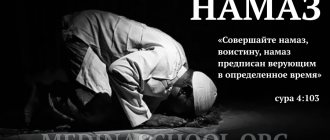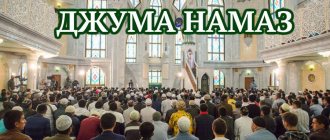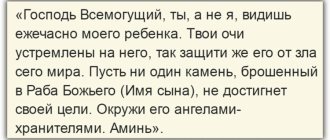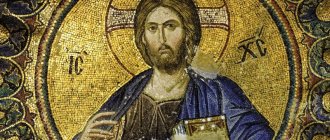What is namaz?
- Namaz is a prayer that followers of the Islamic religion perform every day. It is composed of surahs of the Qur'an that are appropriate to the circumstances. In addition, certain body movements performed by the person praying are obligatory.
- The verses of the Koran and movements form a certain cycle, called a rakat (translated as “circle”), and there are at least two such rakat in each prayer. When praying, a Muslim's face should always be turned towards the qibla , towards Mecca, where the Kaaba is located, which is sacred to adherents of Islam.
- Namaz is a fivefold prayer, i.e., performed 5 times during the day. Sunnis pray . Shiite prayer is three times. The purpose of prayer, as emphasized in the Koran, is to restrain and warn a Muslim from committing a sinful or vile act through prayer.
Namaz is prayer
Dua before bed
It is advisable to read the last 3 surahs of the Koran, as well as verse al-Kursi, before going to bed.
Surah al-Ikhlas
Kul huval-laahu ahad. Allahus-somad. Lam yalid wa lam yulyad. Wa lam yakul-lyahu kufuvan ahad.
“Say: “He, Allah, is One. Allah is Eternal. He did not give birth and was not born. And no one can equal Him."
Surah al-Falaq
Kul a'uuzu bi rabbil-falyak. Min sharri maa halyak. Wa min sharri gaasi-kyn isee vakab. Wa min sharri nnaffaasaati fil-'ukad. Wa min sharri haasi-din isee hasad.
“Say: “I seek from the Lord the dawn of salvation from the evil that comes from what He created, and from the evil of the darkness that has descended. From the evil of those who cast spells and the evil of the envious person, when envy matures in him.”
Surah an-Nas
Kul a'uuzu bi rabbin-naas. Maalikin-naas. Ilyayakhin-naas. Min sharril-waswaasil-hannaas. Allyazii yuvasvisu fii suduurin-naas. Minal-jinnati van-naas.
“Say: “I seek salvation from the Lord of men, the Ruler of men, the God of men. from the evil whispering Satan, who retreats. which brings confusion into the hearts of people. From jinn and people."
After reading the mentioned three suras, you need to blow into your palms and wipe your entire body with them, starting with your face and head (repeat all this 3 times). As it is said in one of the hadiths of the Prophet Muhammad (peace and blessings of the Almighty be upon him), a person who says and does what is mentioned will be preserved from all evil until the morning.
Ayat al-Kursi
Allahu laya ilyayahe illya huval-hai-yul-kayuum, laya ta'huzuhu sinatuv-valya naum, lyahu maa fis-samaavaati wa maa fil-ard, men zal-lyazi yashfya'u 'indahu illya bi izkh, ya'lamu maa bayna aidihim wa maa halfahum wa laya yuhiituune bi sheyim-min 'ilmihi illya bi maa shaa'a, wasi'a kursiyuhu ssamaavaati val-ard, wa laya ya'uuduhu hifzuhu-maa wa huval-'aliyul-'azim
“Allah (Lord)… There is no god but Him, the eternally Living, Existing One. Neither sleep nor slumber will befall him. To Him belongs everything that is in heaven and everything that is on Earth. Who will intercede before Him, not otherwise than according to His will?! He knows what has been and what will be. No one is able to comprehend even a particle of His knowledge except by His will. The heavens and the earth are embraced by His throne, and His care for them does not trouble Him. He is the Most High, the Great!”
In what language is prayer performed?
- The first prayer was, as we know, performed by the Prophet Muhammad . If we talk about what language it was pronounced in, then most scientists are inclined to believe that it was a Turkic group of languages, from which Arabic actually came.
- The Koran states that words of prayer addressed to Allah are pronounced exclusively in Arabic; about a personal request, the Holy Scripture says that it can be expressed in the language that a Muslim considers native (as the sura says - “ in the language of the mother” ).
- It is the Arabic language that is the sign by which, according to the Koran, Allah will recognize real Muslims when the Day of Judgment comes. Thus, namaz, since it is a prayer, is performed in Arabic.
Name options
| Language | Main |
| Albanian | Namazi and Akshamit, Namaz and mbramjes |
| Arab | صلاة المغرب (alāh al-Maghrib) |
| Azerbaijani | Cham namazi |
| Bashkir | Aksham namazı |
| Bengal | মাগরিব (Maghrib, Mughrib) |
| Hindustani Urdu | نماز مغرب (Namaz-e-Maghrib) मग़रिब नमाज़ (Maghrib namaz) |
| Kazakh | Aksham prayers (Aksham prayers) |
| Central Kurdish (Sorani) | نوێژی مەغریب |
| Northern Kurdish (Kurmanji) | Nimeja Svar, Nimeja Meksreb |
| Malay | Solat Maghrib |
| Pashto | ماښام ، مګبیبی دعا |
| Persian, Dari, Tajik | Namozi Maghrib Namozi Maghrib Namozi Shom Namozi Shom |
| Serbo-Croatian | Aksham namaz |
| Somali | Salaada Maghreb |
| Tatar | Ahsham prayers (Axşam namazı) |
| Turkish | Aksham namazi |
| Uigur | شامنامىزى |
| اردو | نماز مغرب |
Mandatory rules for performing namaz
- When reading a prayer, a Muslim must pronounce its words quietly but clearly. There is no need to whisper to yourself or shout - to read the prayer soulfully, you just need a calm voice.
- Under no circumstances should you take any drug that can affect memory or reason (for example, a narcotic or alcoholic substance; you should also not take medications) before reading namaz.
- The prayer should be said in complete purity, after performing ablution (this ritual is called “takharet”), putting on clean clothes and choosing a clean place to read the prayer. The custom involves the use of a special prayer rug (called namazlyk). At its special point, as Islam says, is the ear of Allah. This is exactly what a Muslim should look at when praying in a standing position, and when making prostrations, he should cling to it.
- Turning his face to the Kaaba, a Muslim must utter the words that he intends to perform the ritual of prayer.
- The total number of rakat read by a Muslim is necessarily a multiple of two. In each of the rakaghats, not only prayers must be said in a certain order, but also bows (both waist and prostration) must be made.
- Personal requests to Allah (“doga”), which are pronounced in the native language of the worshiper, are pronounced at the end of the second rakqat.
Morning and evening duas
Dua read in the morning and evening (after Asr): O Allah!
You are my Lord, and there is no god but You. You created me, and I am Your slave, and I will be faithful to the agreement [concluded] with You and the promise [given] to You as long as I have enough strength. I resort to Your protection from the evil of what I have done, I acknowledge the mercy You have shown me, and I acknowledge my sin, forgive me, for, truly, no one will forgive sins except You! A Muslim should recite words of remembrance of Allah in the evening and in the morning. In the morning they say words that mean “We have lived until the morning, and this morning the sovereignty belongs to Allah.” An-Nawawi in the comments indicates that such words explain the state of the person who pronounces these words, and who is convinced that this morning, as always, dominion belongs to Allah Almighty.
In the evening, words are said that mean “We have reached the evening, and this evening sovereignty belongs to Allah,” and praise is also offered to Allah Almighty, which implies that “There is no god but Allah alone, who has no partner. To Him belongs the dominion, to Him be the praise, He can do all things.”
There are also duas that are said both in the morning and in the evening. These are words that remember Allah: “O Allah, thanks to You we lived until the morning and thanks to You we lived until the evening, You give us life, and You deprive us of it, and You will resurrect us for an account.”
Another dua, which should be pronounced both in the morning and in the evening, implies the words “O Allah, You are my Lord, and there is no god but You, You created me, and I am Your slave, and I will remain faithful to You, as long as I have enough strength. I resort to You from the evil of what I have done, I acknowledge the mercy You have shown me, and I admit my sin. Forgive me, for, truly, no one forgives sins except You.”
There are duas that should be recited three times in the morning and evening. This dua sounds like
›››› َ، فَمِنْكَ وَحْدَكَ لَا شَرِيكَ لَكَ، فَلَكَ الْحَمْدُ وَلَكَ ّشُ كْرُ"
and means the Muslim’s recognition that the favors that were shown to him this morning (or in the evening, depending on what time the dua is pronounced) come only from Allah Almighty, for which the Muslim offers praise and gratitude to Allah.
It is advisable to say these words three times in the morning and in the evening: “O Allah, protect my body from everything bad, O Allah, protect my hearing from everything bad, O Allah, protect my eyesight from everything bad - there is no god but You! O Allah, verily, I resort to Your protection from unbelief and poverty, and I resort to Your protection from the torment of the grave - there is no god but You!
One of those duas that can be said in the morning or evening is the dua:
›››› "
which contains a request to Allah to heal the body of the believer, heal his hearing, his vision, and also contains the recognition that there is no God except Allah. The believer in this dua admits that he resorts to the help of Allah from poverty and unbelief, from the torment of the grave. This dua should also be recited both in the morning and in the evening, and should also be recited three times.
O Allah! Verily, this morning/evening I call upon You, those who will bear Your throne, Your other angels and all whom You have created, to testify that You are Allah, and there is no god but You alone, without partner, and that Muhammad is Your servant and Your messenger. (Sunan Abu Dawood. Ar-Riyadh 1427/2007 - 5069, Ahmad bin Shuaib an Nasai. Amal al-yaum wa al-layla. Rabat, 1405/1985 Allah will deliver from the torment of Fire the one who begins to pronounce these words four times in the morning and in the evening.
There are words with which one should remember Allah, both in the morning and in the evening, and these words should be pronounced seven times. These are the words: “بُّ العَرْشِ العَظـيم”, with which the Muslim expresses that the only god Allah is enough for him, and that for him there is no other god, and the Muslim trusts only in Allah, calling Allah the Lord of the great throne.
At what time do you read which prayer in Islam?
- The Koran prohibits performing namaz at the time of sunrise or sunset, as well as when it is at its zenith. Islamic beliefs warn that reading prayers at such moments rather speaks of worshiping the Sun than Allah, which is unacceptable, because it compares a Muslim with a pagan.
- Therefore, for each of the five prayers of the daily prayer, a certain time is set, and it is calculated for each area with great accuracy - in minutes.
Each of the prayers read throughout the day is given a name:
- An hour and a half before the sun rises, the morning prayer of prayer, called Fajr, is read.
- The midday prayer called zuhr is a prayer recited after the hands of the clock indicate the hour of the day.
- A quarter of an hour before sunset falls on the earth, “Asr” is read - this is the name given to the pre-sunset prayer.
- In the evening after sunset, Maghrib begins for Muslims.
- The prayer called “Isha” is read at any time of the night, which precedes the morning prayer.
The main and most reliable hadith on this topic
The angel Gabriel (Gabriel) came (one day) to the Prophet, peace and blessings be upon him, and exclaimed: “Get up and pray!”
Prophet Muhammad, peace and blessings be upon him, performed it when the sun had passed its zenith. Then the angel came to him in the afternoon and again called: “Get up and pray!” The Messenger of the Almighty, peace and blessings be upon him, performed another prayer when the shadow of the object became equal to him. Then Jabrail (Gabriel) appeared in the evening, repeating his call to prayer. The Prophet prayed immediately after sunset. The angel came late in the evening, once again urging: “Get up and pray!” The Prophet performed it as soon as the evening dawn disappeared. Then the angel of God came with the same reminder at dawn and the Prophet prayed as dawn appeared. This happened on the day after the historically important and remarkable night of the Ascension (al-Mi'raj). The next day at noon, the angel Gabriel (Gabriel) came again, and the Prophet, peace and blessings be upon him, prayed when the shadow of the object became equal to him. Then he appeared in the afternoon, and the Prophet Muhammad prayed when the shadow of the object was twice his length. In the evening the angel came at the same time as the day before. The angel appeared after half (or the first third) of the night and performed the night prayer. The final time he came at dawn, when it had already become significantly light (shortly before sunrise), prompting the Prophet to perform the morning prayer. After which the angel Jabrail (Gabriel) said: “Between these two (time boundaries) is the time [for performing obligatory prayers].”
In all these prayers and prayers, the imam for the Prophet Muhammad, peace and blessings be upon him, was the angel Gabriel (Gabriel), who came to teach the Prophet prayers. The first midday prayer and all subsequent ones were performed after the night of Ascension (al-Mi'raj), during which five daily prayers became obligatory by the will of the Creator. In theological works and codes where this hadith is cited, it is emphasized that, along with other reliable narrations, it has the highest degree of authenticity. This was the opinion of Imam al-Bukhari.
How and where is prayer performed?
- Namaz can be performed both in the mosque and at home, both alone and surrounded by many people. You need to come to the mosque if, having heard the call of the imam, a Muslim is not far from it. If the mosque is far away, and it is difficult for a Muslim to get to it due to illness, bad weather or other good reasons, then you can pray at home or at work.
- Having prepared to read the surahs of the Koran and personal prayers (dua), having performed ablution and cleansed clothes and places of prayer, a Muslim must also purify his thoughts, and only then proceed to prayer, the call (adhan) to which is given by the imam.
- The person praying must stand on the prayer rug, on which the qibla is depicted, and turn to the Creator, reading the prayer prescribed by the time of day.
Can be read at home or in temple
Specifics of prayer for women
In Islam, the life of female representatives is determined by separate rules. This also applies to religious rituals. Women under normal conditions should perform namaz separately from men. During collective rituals, they stand behind the men.
To perform namaz, women need to know 5 mandatory rules.
- Covering the awrat - for women, the entire body must be covered with clothing except the oval of the face and hands.
- When performing ruku and sujud, the stomach is pressed close to the hips, and the elbows are also kept close to the body.
- When performing the hand, the knees and back are bent slightly. The toes are not spread on the knees.
- The words are spoken without raising the voice.
- The reading of the first sura is performed with the hands on the chest, the palm of the right hand pressed to the palm of the left.
For women, collective rituals are less important. Unlike men, a ritual performed at home is considered more pious and useful for them.
How should a Muslim dress during prayer?
- Before starting prayer, you should check whether the Muslim's body is covered in accordance with established rules. For men, open areas on the body are not allowed, starting from the knees and ending with the shoulders (shoulders must also be covered). A woman's body should be completely covered, only her face and palms remain open.
- Offering prayer without following these rules is unacceptable either in the mosque or at home. It is also prohibited to wear transparent or tight-fitting clothing, as well as clothing that depicts people or animals.
Sunni tradition
Time begins
- When the sun has completely set below the horizon; Immediately after Asr, the period of prayer ends.[1]
Time is running out
- Most scientific opinions follow the Hanafi school, which Isha'a begins when complete darkness sets in and the yellow twilight in the sky disappears.
- According to a minority view in the Maliki school, the prescribed time for Maghrib prayer ends when the red thread disappears from the sky. According to another opinion of the Shafi'i school, the disappearance of the red thread marks the end of the Period of Necessity. This time can be approximately determined using the sun as a measure. When the sun drops 12 degrees below the horizon, this is roughly equivalent to the color disappearing from the sky. To approximate the moment when total darkness begins, that is, the disappearance of the white thread from the sky, some astronomers say it occurs when the sun descends 15 degrees below the horizon, while others use a safer number of 18 degrees.[3][4 ]Astronomical twilight occurs when the sun is between 12 and 18 degrees below the horizon.
- Maghrib prayer in Udaipur, Mughal Empire.
- Voluntary prayers accompanying the Maghrib to Cairo, Egypt, in 1865.
How is prayer performed by men and women?
- At the beginning of the prayer, a man must raise his hands to ear level and calmly say the obligatory words: “Allahu Akbar.” The woman raises her hands to her shoulders, palms facing up.
- Then the man folds his hands above the navel so that the right one is on top. During prayer, a woman places them on her chest. The gaze is lowered.
- After reading the istiftah dua and the first surah of the Koran, the Muslim bends down, covering his knees with his palms and, making a bow from the waist with his neck and back straightened parallel to the ground, again says: “Allahu Akbar.” Then, making sure that the number of repetitions is odd, he repeats: “Subhana - rabbiyal - azyym.”
- Straightening up, the worshiper brings his hands to his ears and, saying: “Samia - Allah - estuary - hamidah,” lowers them. Afterwards, with the words “Allah Akbar”, a bow is made to the ground (it is called “sujud”), and again an odd repetition: “Subhana - Rabbiyal - A'la.”
- After bowing, the Muslim sits on his heels (this is called “jalsa”) and, folding his hands on his knees, turns to Allah asking for forgiveness. Then again Sujud and an odd repetition of “Subhana - Rabbiyal - A'lya”. Standing up, the worshiper says “Allah Akbar.”
- In the second rakqat, they sit on their knees and read tashshahud. They complete the prayer by turning their heads to the right and left (while pronouncing “As Salam Aleikum wa Rahmatullahi wa Barakatuhu” ).
The procedure for performing evening Maghrib prayer in Islam (VIDEO)
Muslims never tire of repeating over and over again that Islam is not so much a set of ritual instructions, but a real way of life that applies to absolutely all aspects of human activity. Namaz, being an action performed at least five times every day, helps not to forget about it.
5 prayers are distributed by time of day in such a way that a person has time for work, creativity, through which he earns food for himself and his loved ones. It is wrong to somehow single out any of the obligatory prayers; all of them must be performed at the prescribed time:
Verily, believers must perform prayer at a certain time (4:103)
The fourth daily prayer is Maghrib (also known as namaz akhsham or aksham among the Turks or evening prayer in the Russian style). In this article, we will use all these notations equally. After all, the world of Islam is extremely diverse, it consists of many movements, peoples, languages, and therefore understanding this diversity will only strengthen the unity of the ummah.
Please note that the detailed description of the movements in the description of the rak'ahs are presented for men. How women should hold their hands, bow, etc. can be found here.
Maghrib prayer time
The issue of the moment of the onset of aksham prayer does not cause controversy among theologians, unlike the afternoon and evening prayers. Thus, Maghrib can be read after sunset until the shafaq (redness) disappears and the horizon becomes dark. As a rule, the process of disappearing evening light lasts about half an hour (in summer the situation is different, but this is a subject for a separate discussion). That is, within thirty minutes a Muslim must have time to perform Maghrib. It is advisable, if you turn to the hadiths of the Final Messenger of the Almighty Muhammad (s.a.w.), to do this at the very beginning of the time of prayer. Let us give just one example as an illustration: “As soon as the sun sets, begin to read the Maghrib prayer” (At-Tabarani).
The schedule for evening prayers in various CIS cities can be found here.
How to perform Maghrib prayer correctly
Namaz Akhsham consists of three rakats of the fard part and two rakats of the sunnat. There are few differences in how each of them is performed and are identical to the prayers read by believers at other times of the day. However, one important feature of obligatory prayers with an odd number of rakats should be taken into account, which can also be seen in the video.
3 rak'ahs of fard
Rakaat No. 1
Intention (niyat). In Islam, before embarking on a ritual prescribed by religion, a person must correctly formulate in his head what and why he is doing this. This point, despite its apparent simplicity, is extremely important, because “deeds are judged by their intentions” (Al-Bukhari, Muslim).
To perform three rakats of the fard of Maghrib, it is enough just before the prayer, standing towards the qibla, to think that this particular prayer will now be performed. In addition, you can express this thought in words in any language (hereinafter - an example in Russian): “O Allah Almighty! I intend to perform three rakats of fard evening prayer.”
The intention to read namaz implies that a person will not perform extraneous actions and say words unrelated to prayer throughout this act of worship. His gaze should be directed downwards - to the place where the person’s face will be when bowing to the ground (sujud).
Takbir-tahrim. Pronouncing the words “Allahu Akbar” (“Allah is Great!”) in such a way that the palms of the worshiper rise to the level of the face. In this case, the thumbs come into contact with the earlobes (in any case, this is what Hanafis and Malikis do, and Shafiites and Hanbalites can often afford to simply raise their palms to face level). In the Hanafi and Maliki madhhabs, the worshiper pronounces the takbir out loud only when the thumb touches the earlobe. In the other two madhhabs, the expression “Allahu Akbar” is pronounced when the hands are raised at face level.
Sana. After the takbir, the person praying (adhering to the Hanafi, Maliki or Hanbali madhhabs) silently pronounces the following dua prayer:
SubEhanyaka Allahummya wa bihamdikya, wa tabarakasmukya, wa ta'ala jadduka, wa la Ilyaha gairuk
Translation: “Glory and praise to You, Allah Almighty! Your name is the greatest. No one can be equal to You. No one can be worshiped except you. Only you are worthy of this"
Among the Shafiites, the prayer formula “Sana” looks different:
Vajyakhtu vajkhiya lillazii fataras-samavaati val-ard, haniyafyam Muslima, wa ma ana minal-mushrikiin, innas-salaati va nusuki, va makhyaya, wa mamati lillahi Rabbil-'alamiin, la sharika laH, wa bi zalika umirtu wa ana minal-muslimiin
Translation: “My face is directed towards the Creator of the heavens and the firmament. I do not worship anyone else, because, verily, my faith, prayers, rewards, requests, character, life and death - all this belongs to Allah, the Master, Who has no partner. This is what I was told to do. I am truly a Muslim."
To yyam (standing). The worshiper stands towards the qibla, his gaze, as noted above, is directed to the place of prostration, and his hands are placed on his stomach, just below the navel (Hanafi madhhab) in such a way that the right hand clasps the left with the thumb and little finger, and the remaining fingers located along the left arm. Shafi'is place their hands above the navel but below the chest. If the person praying adheres to the Maliki madhhab, then he may not raise his hands at all, but place them at the seams. Hanbalis have the right to decide for themselves exactly how to place their hands while standing.
Following “Sana,” the Muslim silently pronounces “ta’avuz” and “basmalla”: “A’uzu bilLyahi minashshaytaanir-rajiim, bismilLyahi-r-Rahmyaanir-Rahiim” (“I turn to Allah from the wiles of the devil, who deserves to be stoned . In the name of Allah, the Beneficent and the Merciful [I begin the work].” What follows is the first surah of the Holy Quran, Al-Fatihah. It is read aloud, following the rules of Tajweed. Then the person praying also silently reads another sura (usually a short one, for example, “Al-Fil”) or three verses from the Book of Allah in sequence.
Ruku' (waist bow). After the qiyam, the worshiper recites the takbir out loud and bows in such a way that, placing his hands on his knees, he bends his body in the shape of the letter “G.” The back and head should be parallel to the floor, gaze directed at the feet. In a state of bowing from the waist, a person says the words three times: “Subehanya Rabbial-'Azyym” (“Our Lord is pure [from evil]”). Then the believer comes out of the state of prostration, saying: “Sami'aAllahu limyan Khamidya” (“The Almighty knows all the glorifications [that are addressed to Him]”). Having assumed a vertical position (arms are lowered, held at the seams, the gaze is directed to the place of prostration), he says to himself once: “Rabbanya, LaKa-l-hyamde” (“O Lord of the worlds! All these praises are for you”).
Sujud (prostration). While in an upright position, the worshiper pronounces takbir and bows to the ground. First, he lowers his knees to the floor, then puts his hands on the floor and places his head between them, keeping his eyes open. According to the Hanafi madhhab, the hands should be at head level, while the Shafi'is place them at shoulder level.
Adherents of the Hanbali madhhab slightly change the order of bowing to the ground in such a way that first they lower their hands to the floor and only then their knees.
When the forehead and bridge of the nose touch the floor, the worshiper says the following words three times: “Subehanya Rabbi al-A'la” (“Pure [from any negativity] is My Great Lord”). Next, he recites takbir and sits on his left leg. The right leg is bent in such a way that the believer does not sit on it, and its toes are directed towards the qibla. The worshiper stays in this position for two to three seconds, after which he again says “ Allahu Akbar” and performs sujud. The words from the first prostration are also repeated there.
A person leaves the sujud, reciting takbir and returning to the position of qiyam (standing). In fact, this is the beginning of the second rak'ah of the Maghrib prayer.
Rakaat No. 2
The worshiper again reads Surah Al-Fatiha and an additional Surah (say, Quraish) out loud. Then ruku' and sujud are performed according to the scheme described above.
Cu'ud (sitting). After prostration, the worshiper does not immediately move to the third rak'ah, but sits in the same position that he occupied between the two parts of the prostration. In a sitting position, he recites the dua “Tashahhud”:
Attyakhiyatu lillahi you-salavatu vattaiibyat. Assalamu 'alaika, ayuhannabiyu, va rahmatullahi vabarakatuhu. Assalamu 'alaynya wa 'ala 'yybadillahi-s-salihiin. Ashhadu al-la-ilaha illa-Llahu, wa ashhadu an-na Muhammadan gabduhu wa rasuluh
Translation: “Our greetings, prayers and praises go to You, Lord. Peace be upon you, our Prophet, mercy upon you from the Almighty Creator and His blessings. I bear witness that there is no one worthy of worship except Allah. I testify that Muhammad is His servant and messenger."
Some Muslims, while reading the Tashahhud in the words of the testimony “Ashhadu al-la-ilaha illa-Llahu,” raise the index finger of their right hand and hold it in this position until the words “wa Ashhadu an-na Muhammadan gabduhu wa rasuluh” are pronounced " After completing the dua, the worshiper moves on to the third rak'ah - the final one within this part of the ahsham prayer.
Rakaat No. 3
As part of the third rak'ah of the Maghrib prayer, it is worth paying attention to the very end. In the qiyam, the worshiper reads Al-Fatiha again (but to himself). An additional sura or verses are no longer needed here - the bow and prostration immediately follow.
After Sujud, you must remain in a sitting position (ku'ud) and say "Tashahhud" , followed by the dua "Salavat":
Allahumma salli ala Muhammadin wa 'ala Ali Muhammad. Kamaa salayta 'ala Ibrahiima wa 'ala Ali Ibrahiim. Innyaka hamidum-majiid. Allahumma byarik 'ala Muhammadin wa 'ala Ali Muhammad. Kamaa baraktya 'ala Ibrahiima wa 'ala Ali Ibrahiima, innyaka hamiidun majid
Translation: “O Allah! We ask you to bless Muhammad and his family, just as You once blessed Ibrahim and his family. Verily, You are Worthy of Praise. O Allah! Please send blessings upon Muhammad and his family, just as You sent blessings upon Ibrahim and his family. Verily, You are Worthy of Praise and Glory.”
Next, the worshiper must recite a verse from Surah Al-Baqarah :
Rabbanya-attiinya fid-dunya hassanatya va fil ahiiraati hassanata-u va kyina gazabannar (2:201)
Translation: “O our Lord! We ask You to give goodness in this world and the Eternal World. We also ask for protection from Hell and its torments."
“Tashahhud”, “Salavat” and a passage from the Koran are pronounced by the person praying silently.
Taslim (greeting). After an excerpt from Surah “Cow”, the person praying in both directions loudly says the words of greeting: “As-salamu galaikum va rahmatullaa” (“Greetings to you and the mercy of the Almighty Creator”). The “you” in the greeting refers to other worshipers, angels and Muslim jinn. It is important to direct your gaze first to the right, then to the left shoulder.
Next, having said “Astaghfirullahi” (“Forgive me, O Allah”) three times, the worshiper pronounces the final dua:
Allahumma Antas-salayamu vaminKya-s-salamu. Tabarakta ya zal-jalaali wal-ikram
Translation: “O Allah! You are the world, and You are the source of this world. Give us Your blessing."
A person reads the prayer of greeting, looking at his open palms, raised to chest level. After its completion, he says the word “Amen.” This completes the three rak'ahs of the fard part of the evening prayer.
2 rak'ahs sunnat
This part of the general Maghrib prayer is not much different from fard. Except that the suras in the first two rakats, takbirs and greetings are not pronounced out loud. In addition, in the second rakah after “Tashahhud”, “Salavat”, “Rabbana”, taslim are immediately followed and the final dua is made. After this, the believer can begin reading Ayatul-Kursi, dhikrs and tasbih dua.
What prayers are read during prayer?
The most important prayers are the following:
- Janazah prayer. This is a prayer for repose, which is read collectively in front of the body of the deceased. At the same time, dua is also read. There are no bows during this prayer; Muslims say it while standing.
- Juma prayer. The prayer consists of two rakat and is read on Fridays at the end of the Friday sermon.
- Eid prayer. It is read collectively on the holidays of Kurban Bayram, when Hajj ends, and Uraza Bayram, ending the fast in Ramadan.
It is also advisable to pray, asking Allah for rain, and during the occurrence of eclipses - both lunar and solar.
Is it possible to perform namaz only once a day?
- The fivefold prayer is obligatory for the followers of the Prophet Muhammad. Those who do not comply with this rule will not be allowed into heaven.
- The time of each prayer is wisely distributed by Allah and has its own meaning. Hadiths talk about this. According to Sharia law, you can only skip prayer if you are forced to (for example, this is permissible for women during menstruation or when she is cleansing after childbirth, mental illness, children before they reach puberty). In addition, every prayer that is forcibly missed must be made up.
Evening prayer (Maghreb) - immediately after sunset and before the disappearance of the evening dawn
The time period of this prayer, compared to others, is the shortest, so you should be especially attentive to the timeliness of its performance. The hadith, which tells in detail about the arrival of the angel Gabriel (Gabriel) over two days, makes it possible to clearly understand that it is advisable to perform Maghrib prayer at the beginning of its time period.
Prophet Muhammad, peace and blessings be upon him, said: “Goodness and prosperity will not leave my followers until they begin to leave the evening prayer until the stars appear.”
How to make up for missed prayers?
- Missed morning prayers are performed after the sun rises.
- When praying in a mosque, the next prayer is performed first, then the missed one, and when praying alone, vice versa.
- If there is not enough time for the prayers to be read one by one, the prayer that is about to end is performed first, otherwise it will be missed, and then the missed ones.
- Having missed all the prayers for a valid reason, a Muslim must perform them one by one, trying to do this until the time allotted for night prayer expires.
- Having missed the fivefold prayer, it can be made up during the next day, while taking turns reading the current prayer first, then the missed one.
- Having missed the night prayer, it should be said immediately as soon as the Muslim wakes up, before the morning prayer.
Reading is important for men and women
prayer in islam for the baby to sleep
the child (5.5 months) sleeps very poorly, we put him to bed screaming, during the day he wakes up for 40-45 minutes, and at night he wakes up from any noise and cries, often cries in his sleep. His teeth are not cutting yet, tell me what prayer to read so that he sleeps soundly , otherwise I’m already exhausted.
Islam: prayer in Islam for the child to sleep
The Orthodox say that when they pray to the saints, they are not praying to the saints, but to God through the saints. Those. saints help them convey their prayers to God. But in Islam they pray directly to God. God is omnipotent, he does not need any helpers to hear prayer. He may not hear the prayer if a person does not believe in God. Question: can Orthodox Christians be considered weak people who do not have the kind of faith that allows them to turn to God directly?
With Christianity everything is clear. There is original sin and God saves a person from it. Paradise is also called a place of salvation in the Koran. What is a person saved from in Islam?
>> The place of salvation from retribution for unbelief, as I understand it, but I don’t remember the specific words that you cited there. 40:41 “Oh my people! Why am I calling you to salvation, and you are calling me to Fire?” The word “salvation” is in all translations.>> I could be wrong, but there is no salvation in Islam. From the Muslim point of view, you are mistaken.
ARE THERE ANY STONES OR METAL IN ISLAM THAT CAN PROTECT A CHILD FROM THE Evil EYE?
We need peace, harmony in the family and prayer from the heart, then everything will pass. The main thing is peace and love of parents
Go to the pediatrician. Determine the reason for such nervousness. Examine the child.
Is it possible to perform namaz more than 5 times a day?
The fivefold prayer is established by Allah and this rule cannot be violated. But you can read additional prayers:
- Tahajjud is a prayer that is recited at home before the pre-dawn prayer begins.
- Witr - this prayer can be used to end the reading of Tahajjud.
- The prayer of the spirit is read after the sun rises, but before the start of Zuhr prayer.
- Tarawih is a congregational prayer in a mosque during Ramadan.
- Istikhara is a prayer that is read in order to make the right decision, to make the right choice.
Useful articles on the site:
- Muslim signs for sneezing
- Islam and Islam - are they the same thing or not?
- Why Muslim women cannot go to the cemetery
- Best Muslim Girl Names by Alphabet
Nighttime prayer before bed
Prayer at night is a mandatory action for a believer. At this moment, a person opens his soul to the Higher Powers and thanks the Lord for the day he has lived. It is important to understand that by ending the day with prayer, you can cleanse yourself of negativity and protect yourself from the influence of negative energies. Prayer before bed has a calming effect. It allows you to get rid of accumulated experiences, worries and bad thoughts. Thanks to evening prayer, a person begins to believe in the best and thereby attracts good luck.
What prayer to read before bed
Before going to bed, you can read a variety of prayers. You can use long prayer appeals from an existing prayer book, but we should not forget that every spoken word should be recognized and understood. Short prayers are more popular. It is also allowed to pray in your own words, expressing all the feelings that you experienced in the past day.
It is important to understand what needs to be mentioned in evening prayer.
You need to ask the Higher Powers for the following:
- About the salvation of soul and body.
- About forgiveness of sins.
- About getting rid of enemies and addictions.
- About protection from demonic temptations.
- About help in future endeavors.
- About patience and endurance.
You need to pray in the evening before going to bed every evening, no matter how the day went, whether it was successful or whether there was a lot of negativity in it. In any case, God should be thanked for the day, because everything that happened was sent down by him.
Evening rule for bedtime prayer
The prayer book contains all the prayers that can be read before bed. During prayer, you need to mentally look back and analyze the events of the past day. It is necessary to admit and realize your mistakes, and also be sure to ask for forgiveness for accidentally committed sins. If you understand that you have done something unlawful, then in your evening prayer, pay attention to asking God to remove the burden of what you have done from your soul. This will calm your soul and, on a subconscious level, you will be prompted for ways to resolve the situation.
The Lord will hear your doubts and mental anguish expressed during evening prayer. With sincere faith, you will definitely be given signs to choose the true path in life.
Also, one should not forget to pray in the evening to the Saints of God, whose merits in earthly life were noted by the Lord. They were given the power not only to support people in good deeds, but also to pray for the salvation of the souls of believers before the Savior.
Orthodox prayer for the night when you go to bed
Orthodox Christians should pray just before they go to bed. You need to read a prayer before going to bed, completely renouncing external life, focusing on your inner world. You need to pronounce the words of the prayer text very softly, in a half whisper. As a rule, the prayer before going to bed is read once, after which you should immediately try to fall asleep. But if an internal need arises, then the prayer text can be repeated.
The text of the prayer, which is said immediately before going to bed, is as follows:
A short prayer to the Guardian Angel before going to bed
A prayer before going to bed to the Guardian Angel will allow you to surrender your soul and consciousness during sleep to the protection of the Higher Powers. It is very important to fill your prayer with words of gratitude for the day you have lived. Your Guardian Angel was with you all the time during the day and it was thanks to him that the negativity was minimized. If you have children, then you should teach them to pray to their Guardian Angel before going to bed from early childhood. It is best to say a short prayer to the Guardian Angel while lying in bed.
It sounds like this:
The above words should be repeated three times, trying to gradually fall asleep while pronouncing them.
Listen to the prayer to the Guardian Angel online:
Prayer to the Blessed Virgin Mary for a child at night
All parents pay great attention to their child’s proper sleep. First of all, a baby's sound sleep indicates his good health. In addition, by fully resting at night, the child will fully grow and develop.
Very often, a baby’s sleep is disturbed due to instability of the developing nervous system. It can be disrupted by daytime worries and overwork from active pastime. A mother's prayer before bedtime will calm her baby. The affectionate voice of the closest and dearest person gives the child a feeling of security and promotes rapid falling asleep and restful sleep.
The Mother’s prayer will definitely be heard by the Higher Powers. The Lord God will definitely give instructions to the Guardian Angel of the baby to accompany him and protect him from various troubles. The Prayer to the Most Holy Theotokos for a child at night has special power. It is difficult to overestimate its influence on the baby’s safe sleep. This prayer is especially important for a child who has not reached the age of seven. It is believed that it is until this age that the baby needs the protection and patronage of the mother.
The prayer to the Most Holy Theotokos should be read three times. In this case, hands should be placed on the child, as if covering him from life’s adversities. Along with parental hugs, the baby will receive protection and grace from the Most Holy Theotokos. The child will receive a Heavenly blessing, and all misfortunes will pass him by.
The prayer words are as follows:
Jewish prayer read at night
Judaism recognizes the enormous power of prayer, although biblical Judaism does not provide required reading texts for prayer. Therefore, before going to bed, believers can read any prayer, but they can also turn to the Higher Powers in their own words.
The power of any Jewish prayer lies in the fact that it brings a believer closer to the Creator. A sincere prayerful appeal to the Lord opens the gate to the Heavenly Treasury. People who adhere to the Jewish faith understand that nothing can be achieved in life without prayer.
An important requirement in the process of offering prayer is full awareness of each spoken word. In addition, in order for a prayer appeal to be heard, it is necessary to constantly improve oneself and move through life, overcoming step by step.
The prayer “Shema, Israel” is most often recited before going to bed. It is very important, before pronouncing the sacred prayer text, to analyze the events of the past day and give an unbiased assessment of one’s own deeds and actions.
The abbreviated translation is as follows:
A more complete text of the prayer and its translation can be taken from the Talmud.
Strong Muslim prayer before bed
Everyone knows that prayer plays a big role in Islam. Muslim prayers before bed are a special type of appeal to Allah, which is particularly powerful.
Before going to bed, you should join your palms, blow on them and read the following surahs: “Sincerity” (Ikhlas), “Dawn” (Falyak), “People” (Us). After this, you need to run your palms over the entire body, starting with the head. These steps should be repeated three times and then go to bed.
Surah Sincerity (Ikhlas) was given to Muslims in Mecca. It consists of 4 verses that emphasize the exclusivity of Allah and his blessing.
The semantic translation of Surah “Ikhlas” means the following:
Surah "Dawn" (Falyak) refers to protective means. The Prophet Muhammad himself argued that it is the best remedy for those who seek protection from Allah.
The semantic translation of the sura is as follows:
This sura reliably protects a person during night sleep, when the soul becomes most defenseless. This surah allows you to take refuge with Allah.
The translation of the last sura is as follows:
Muslims are also recommended to read the verse “al-Kursi” before going to bed, which in translation reads as follows:








